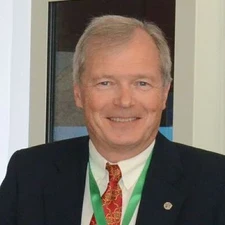René Forsberg

The 2025 Vening Meinesz Medal is awarded to René Forsberg for significant and impactful advancements in geodesy, geophysics, and cryosphere research, and for pioneering work, particularly in gravity field modelling and geoid determination.
René Forsberg's early work set the stage for a lifelong dedication to advancing our understanding of the Earth's gravity field and its applications. His contributions to gravity field modelling are foundational, enhancing the precision of geoid determination - a crucial element for accurate Earth observation and satellite navigation. Throughout his career, he has been instrumental in educating most of the world's geodesists through decades of "Geoid Schools" under the International Association of Geodesy (IAG). In his role as a Professor in Geodynamics at DTU Space and former Department Head at the Danish National Space Institute, Forsberg has driven numerous innovative research projects and field campaigns. His leadership in this area has provided new insights into the dynamics of ice sheets and their responses to climate change. Notably, he has been instrumental in the Greenland Gravity Mapping program since 1991.
Forsberg's work has also had a profound impact on the field of geodesy, through development of airborne methods for geodesy, geophysics, and cryosphere mapping, including lidar and radar technologies, which has revolutionized the way we conduct fieldwork in some of the most challenging environments on Earth. These advancements have not only improved data accuracy but have also facilitated more frequent and comprehensive monitoring of remote regions, such as the Arctic and Antarctica. Forsberg has coordinated numerous national and international airborne surveys across our planet. A spectacular project was the gravity and height survey in Mongolia and Nepal in 2010, which included the re-measurement of the height of Mt Everest. Furthermore, Forsberg advises the European Space Agency (ESA) as a member of their highest-level advisory board on Earth observation, particularly concerning upcoming satellite gravity field missions. He is also involved in cutting-edge research on cold atom gravimeters, which can determine local-scale gravity field changes from space.
Forsberg's work has stimulated new views and insights across multiple disciplines. His research has provided a deeper understanding of the interplay between Earth's gravity field and climate dynamics, particularly in polar regions. The methodologies he has developed for airborne geophysics are now standard practice, enabling more accurate and efficient data collection in geodesy and Earth observation. His work has not only advanced our understanding of the Earth but has also provided invaluable tools and methodologies that will benefit future research and practical applications for years to come.
